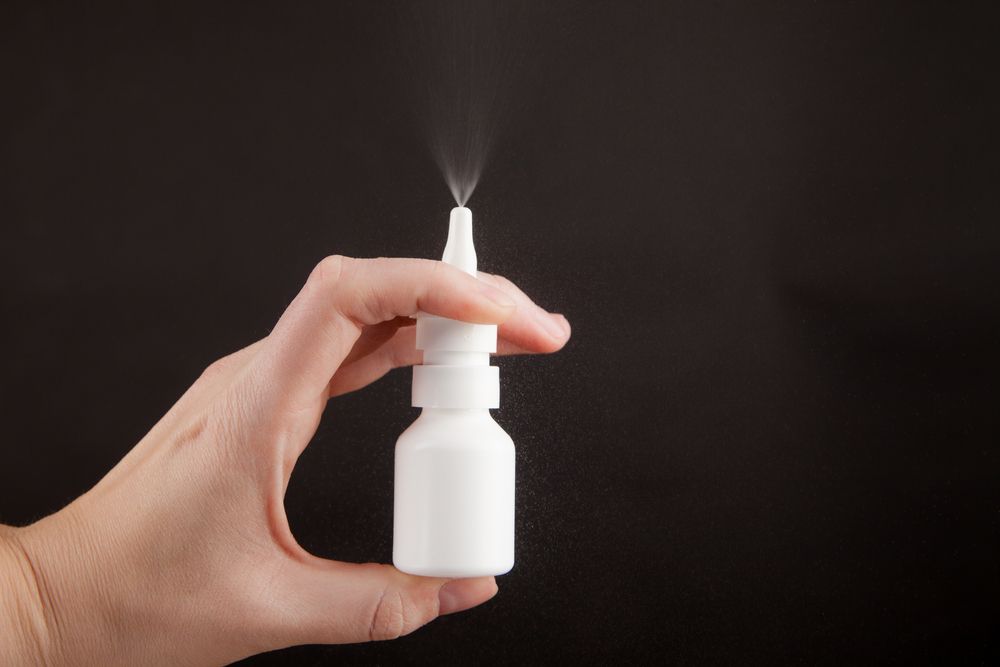Flonase or Nasonex? Which Is More Effective for Allergy Treatment?
Both Flonase and Nasonex are well-known medications. Flonase is available over the counter, while Nasonex is a prescription medication. They both fall into the category of nasal corticosteroid sprays. Both of these medications work in the following manner:
They relieve congestion and stuffiness in people with allergies to make it easier to breathe.
They work best for people who have nasal polyps. These are benign growths that could make it harder for people to breathe.
Most corticosteroid sprays do not alleviate symptoms before at least two weeks of use.
Unlike sprays used for cold symptoms, these sprays are best used every day.
Patients may need a nasal spray like Nasonex or Flonase if they are dealing with a condition called allergic rhinitis. Per Healthline, allergic rhinitis occurs after coming into contact with an allergen. An allergen is a substance that your body treats as harmful. The substance can come from the air, food, or various other products. Common airborne allergens are pollen, dust, dander, and mold. The following symptoms are associated with allergic rhinitis:
Watery eyes
Itchy nose
Stuffiness in the nose
Sneezing
Hives
Fatigue
Dripping nose
Cough
Nasal sprays only treat the symptoms relating to your nose. In some cases, your insurance may cover nasal sprays, which can help you save money. While nasal sprays can effectively relieve allergy symptoms, they are associated with some side effects.
Flonase

Flonase is a nonprescription form of fluticasone spray. It can effectively treat the most common allergy symptoms:
Runny nose
Itchy, watery eyes
Sneezing
Stuffy nose
It is commonly intended to treat symptoms of allergies caused by pet dander, pollen, mold, or dust. It may also be used to treat nasal polyps and other conditions that may lead to sleep apnea, snoring, or upper airway resistance syndrome, a condition in which sleep is not as restful as it could be because people continue to wake up. There are some people who should not use Flonase, such as:
Those with an open ulcer or sore, as the spray could interrupt the natural healing process.
Those who have recently been treated with another corticosteroid.
Children (in the long term)
Those who have conditions like glaucoma, intraocular pressure, or cataracts.
It is not yet clear if women who are pregnant or nursing can use the medication. The decision is usually made on a case-by-case basis by a woman and her obstetrician. If you plan on using Flonase, talk to your doctor about any other medications you may be taking. Flonase is known to interact with other medications
Nasonex
Unlike Flonase, Nasonex is only available via prescription. That means that in order to be able to buy it, you need to visit your doctor and receive a diagnosis. After this, you can buy Nasonex at a pharmacy that fills the prescription. The medication is a corticosteroid that can be used to treat conditions that make it harder for you to breathe through your nose, such as allergic rhinitis, sleep apnea, and nasal polyps. This medication works by decreasing the presence of chemicals called cytokines. Your immune system forms these chemicals as an inflammatory reaction to something harmful. A reduction in these chemicals is what experts believe makes it easier for you to breathe after use.

Differences Between These Medications
Both Flonase and Nasonex have several things in common.
Each of these is sold in strengths of 50 mcg per spray, according to Healthline.
They can both be used for nasal allergic rhinitis symptoms.
There are also major differences between the two.
Adults can use Flonase for up to six months and children can use it for up to two months. For Nasonex, your doctor will determine how long you should use the medication. It is common for doctors to do additional testing if you use Nasonex and your condition does not improve.
Insurance companies may not cover your use of Flonase because it is an over-the-counter medication. Patients who use Nasonex may receive coverage for the medication because it is a prescription medication only. Check with your insurance provider regarding coverage for this medication.
Nasonex appears to offer certain advantages in comparison to Flonase, such as:
Ability to treat nasal polyps.
Prevention of allergic rhinitis.
Side Effects
Both Flonase and Nasonex can result in some common side effects.
Sore throat
Headache
Bloody nose
Cough
Both medications can also cause some serious side effects.
Injury to the septum
Decreased ability to heal wounds
Allergic reaction
Interruption in growth in children and teens
Cataracts
Glaucoma

Which Do Doctors Recommend More?
Doctors don’t prefer one brand over the other across the board. Their recommendation will depend on the particular case. If you suspect you are dealing with allergic rhinitis, it is important to speak with your doctor. They can perform necessary tests to make sure you both know what you are dealing with. Nasal sprays can be crucial in helping you feel better if you are suffering from allergic rhinitis. If nasal sprays alone are not helping you, your doctor can recommend additional treatment methods.
Frequently Asked Questions
What are corticosteroid nasal sprays? If you have had a stuffy nose in the past because of a cold, you may have used nasal sprays. These options should only be used for a limited time, and they do not contain the same types of medication as a corticosteroid spray. Mayo Clinic explains that corticosteroids work by imitating hormones in the body that ward off inflammation. This can provide soothing relief from conditions caused by an increase in inflammation, including allergic rhinitis. Corticosteroids can also override your immune system, which can be useful when it attacks a harmless allergen. What is allergic rhinitis? Also known as hay fever, allergic rhinitis is a reaction to a set of allergens. The most common source of allergic rhinitis is pollen. You can tell you have allergic rhinitis if experience symptoms like nasal drip, coughing, watery eyes, a sore throat, and tiredness. Statistics show that approximately 8 percent of Americans are affected by allergic rhinitis. What kinds of other conditions can nasal sprays treat? In addition to allergic rhinitis, some nasal sprays can also treat nasal polyps and even breathing patterns that are disrupted by sleep disorders. Nasal polyps are tissues that have expanded in size. They make breathing difficult because they can block your nasal airway. As for sleep disorders, disruptions in your nasal passages can cause snoring or worsen sleep apnea. Nasal sprays are often prescribed to open your airway and improve sleep. What can I expect from my insurer if I need a prescription nasal spray? Nasonex requires a prescription, which means your insurance may be able to offset some of your costs. If your doctor writes a prescription for an OTC medication, such as Flonase, your insurance may also cover the cost of this medication, depending on your plan. If you receive a generic version of either of these nasal sprays, your insurance may cover it automatically. However, you may be required to notify your insurer if you receive the brand-name version of Nasonex. This is called reauthorization. Are there any side effects I should expect? Like any other medication, nasal sprays are known to cause side effects. Most of these are not serious, such as sneezing. Other side effects, such as dryness in the nose, can be mitigated by using the spray after a hot shower. Serious side effects, such as bleeding, tears in the septum, headaches, and nosebleeds, should be discussed with your physician immediately.
References
Flonase Nasal Spray for Over-the-Counter Allergies Treatment. (March 2019) Verywell Health.
Fluticasone Nasal Spray. (April 2019) MedlinePlus.
Nasonex Nasal Spray to Treat Allergies and Snoring. (August 2017) Verywell Health.
Nasal Corticosteroid Sprays. (November 2017) MedlinePlus.
Overview of Nasal Sprays for Allergies. (May 2018) Verywell Health.
Flonase Nasal Spray for Over-the-Counter Allergies Treatment. (March 2019) Verywell Health.
Allergic Rhinitis (June 2017) Healthline.
Flonase vs. Nasonex: Which Is Better for Me? (May 2017) Healthline.
Predinesone and Other Corticosteroids. (November 2018) Mayo Clinic.

Related Articles

10 Popular Statin Medications - Comparison, Side Effects & How They Work
Statins are among the most commonly prescribed...

Pregabalin vs Gabapentin - Comparison Guide & Similarities
Pregabalin vs Gabapentin, are both classified as...

Zepbound vs Mounjaro Comparison Guide: Similarities, Side Effects & More
Zepbound vs Mounjaro Comparison Guide...

Aleve vs Advil - What's The Difference? Comparing These NSAIDs
SaveHealth a prescription website compares Aleve vs Advil...
